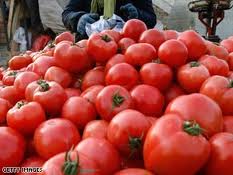U.S., Mexico unveil plan to head off trade war over tomato imports

WASHINGTON – The United States and Mexico have reached tentative agreement on a pact that could avert a feared trade war over tomatoes, but would sharply raise prices in the process.
The agreement, published in Friday’s Federal Register, calls for Mexican growers to raise the base price of tomatoes sold in the U.S., in exchange for authorities here dropping an investigation into whether the Mexicans were selling tomatoes below cost.
Importers in Arizona said the higher prices would likely mean fewer sales, and the ensuing drop in imports would have an economic ripple effect in Nogales and other ports of entry.
But Florida growers, who originally called for the investigation into Mexican pricing, said they are cautiously optimistic that the decision will help their industry.
“I don’t think we’ll see monumental growth in the industry. It’s really about preservation at this point,” said Matt Joyner, director of federal affairs for the Florida Department of Agriculture.
Growers across the United States need this protection because they simply cannot compete with tomatoes sold below the production price, Joyner said.
But the “outlandish” price hikes proposed in the deal could hurt U.S. companies that package and ship tomatoes, other officials said.
Arizona tomato importers are worried they will lose their grocery store contracts to Florida companies because of the prices called for in the proposal, said Lance Jungmeyer, the president of the Fresh Produce Association of the Americas.
“It’s going to have an immediate impact,” Jungmeyer said.
He said that in 2011, $1 billion in produce passed through Nogales, the largest port of entry for fresh produce into the U.S., and that tomatoes typically account for about one-third of that traffic.
If trade is reduced by 10 or 20 percent, Jungmeyer said, Nogales would see a proportionate decline in employment and a negative ripple effect within suppliers.
“People in town are worried,” he said.
But while the association plans to file comments on the proposal, Jungmeyer thinks it is unlikely the final deal will change.
“I think this is the best deal we’re going to get,” he said.
Bret Erickson, vice president of the Texas International Produce Association, agreed with Jungmeyer that while the deal is not perfect, it is still better than the trade war that might have broken out. The disagreement over tomatoes could have carried over to other commodities and hurt other industries, he said.
“We’re pleased to see that we’re close to avoiding a trade war,” Erickson said.
But the cost of avoiding a trade war could be higher prices for consumers.
“If they want great-tasting tomatoes that Mexico grows, they will be paying higher prices,” Erickson said.
Mexican tomatoes are vine-ripened while those in Florida are picked green and ripened with gas, he said.
A study by the Nielsen Perishables Group for the Fresh Produce Association of the Americas predicted that in the winter the price of greenhouse tomatoes could double and the price of field tomatoes could increase about 50 percent.















